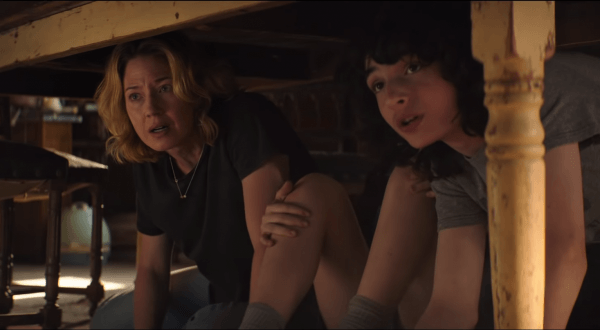Ghostbusters: Afterlife, 2021.
Directed by Jason Reitman.
Starring Finn Wolfhard, Mckenna Grace, Paul Rudd, Carrie Coon, Sigourney Weaver, Bill Murray, Dan Aykroyd, Ernie Hudson, Annie Potts, Logan Kim, Celeste O’Connor, Oliver Cooper, Sydney Mae Diaz, Bokeem Woodbine, Marlon Kazadi, Tracy Letts, Paulina Jewel Alexis, Josh Gad, and J.K. Simmons.
SYNOPSIS:
When a single mom and her two kids arrive in a small town, they begin to discover their connection to the original Ghostbusters and the secret legacy their grandfather left behind.
It’s never a good sign when a film is preceded by a quick prerecorded video of the director (in this case, it’s Jason Reitman, the son of Ghostbusters 1984 helmer Ivan Reitman) proclaiming that what viewers are about to see is an extreme Easter Egg hunt. Admittedly, Ghostbusters: Afterlife, while not exactly subtle about its references to the original, temporarily does a decent job of balancing such fan service with paving the road for new heroes. And then the third act comes, which is not only a ghastly CGI mess of colors and creatures that feels like something ripped out of the Marvel playbook but also indulges in the past to a cringe degree that takes the thunder away from the younger cast through special effects and plot points that are unnecessary.
The disappointing finale hurts more considering Ghostbusters: Afterlife is surprisingly decent and relatively charming up until that point as it positions itself as exciting and hip. Mckenna Grace (underappreciated and talented, having impressed by Gifted and in more minor roles such as I, Tonya) stars as Phoebe, the young granddaughter to Harold Ramis’ Egon Spengler. Unfortunately, she never got to meet the like-minded brainiac, as Egon had a strained relationship with his daughter Callie (another tremendous yet underrated performer in Carrie Coon), seeing him moving to a farmhouse in the middle of nowhere preaching the end of the world. She’s not the only one that thought he was insane; the rest of the Ghostbusters team also broke off from him, eventually disbanding as spectral sightings ultimately fizzled out anyway.
Egon is now dead (presumed to be natural causes), so with Callie facing a financial crisis paying the apartment rent, she relocates the family to the farmhouse, hoping it will be worth something on the market or have a valuable heirloom. Luck is not on her side, ensuring the family stays there for the time being. Phoebe’s brother Trevor (a jittery Finn Wolfhard) is slightly better at making friends, crushing on a restaurant worker named Lucky (Celeste O’Connor). In contrast, Phoebe virtually has no one like-minded curious about science, which is especially a shame considering she tells a plethora of intentionally awful yet funny science-related jokes.
Ghostbusters: Afterlife works when it’s playing up the role science has in this family’s life, specifically between mother and daughter (and more importantly, a granddaughter that is not aware she is related to a famous Ghostbuster). As Phoebe explores the farm, uncovers familiar gadgets, and even discovers a supernatural threat, she finds information about her family tree through the assistance of YouTube and a newly befriended summer-school pal that has nicknamed himself Podcast (Logan Kim). On that note, not every character here is a winner; Podcast comes across more like an embarrassing gimmick rather than clever comedic relief in a movie that’s already primarily intended to be funny. Nevertheless, the more Phoebe learns, the more a rift grows between daughter and mother, with the latter perceiving science as a waste of time that fractured the core foundation of her family.
Paul Rudd is also here as the laid-back summer school teacher with a vested interest in science, mystified regarding some inexplicable tectonic shifts in the area. Unsurprisingly, he’s a hilarious presence here, whether playing off the children or flirting with Callie. Naturally, by trying to have it both ways, he inserts himself into situations that see him discreetly sticking up for Phoebe away from the peripheral vision of Callie, which is also occasionally amusing. As well, presence as Paul Rudd always is, Ghostbusters: Afterlife is most enjoyable when it simply sticks to Phoebe; she’s inquisitive, has a sense of humor, believably emotes, and rocks the action-oriented sequences (such as a gunner seat within the new Ghostbusters vehicle). Everyone else (discounting Paul Rudd) is either annoying or bland.
There are assuredly some impressive practical effects to be found here in Ghostbusters: Afterlife, but once the threat balloons into a fate of the world situation, every set piece feels defined by CGI and lackluster imagination. The script (also written by Jason Reitman and with help from Gil Kenan) relies on veteran cameo appearances to inject some life into the climax, but ironically it’s what kills off any goodwill the movie had. By this point, it’s no longer an Easter Egg hunt; it’s a shameless nostalgia desperate to be liked and applauded. Such a thing hopefully won’t even happen in the afterlife.
Flickering Myth Rating – Film: ★ ★ / Movie: ★ ★
Robert Kojder is a member of the Chicago Film Critics Association and the Critics Choice Association. He is also the Flickering Myth Reviews Editor. Check here for new reviews, follow my Twitter or Letterboxd, or email me at MetalGearSolid719@gmail.com














